Related Research Articles

The Tulane University School of Medicine is the medical school of Tulane University, a private research university in New Orleans, Louisiana. The school is located in the Medical District of the New Orleans Central Business District.
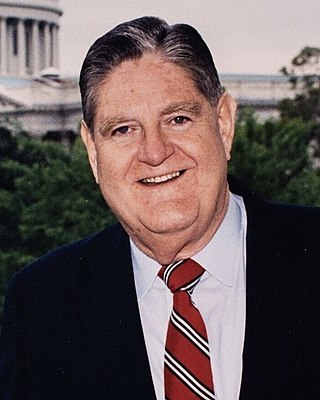
Howell Thomas Heflin was an American lawyer and politician who represented Alabama in the United States Senate from 1979 to 1997.
Paul Dudley White was an American physician and cardiologist. He was considered one of the leading cardiologists of his day, and a prominent advocate of preventive medicine.
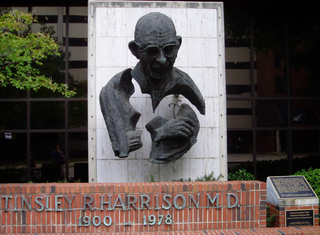
Tinsley Randolph Harrison was an American physician and editor of the first five editions of Harrison's Principles of Internal Medicine. Harrison specialized in cardiology and the pathophysiology of heart disease.

UAB Hospital is a 1,207 bed tertiary hospital and academic health science center located in Birmingham, Alabama. It serves as the only ACS verified Level I Trauma Center in Alabama, and is the flagship property of the UAB Health System which is owned by the University of Alabama System. The system includes clinics, an eye hospital and affiliations with other health care facilities throughout the state. It is Birmingham's largest employer, with a staff of over 20,000.
Eugene Braunwald is an Austrian-born American cardiologist.

The University of Alabama at Birmingham Marnix E. Heersink School of Medicine is a public medical school located in Birmingham, Alabama, United States with branch campuses in Huntsville, Montgomery, and at the University of Alabama College of Community Health Sciences in Tuscaloosa. Residency programs are also located in Selma, Huntsville and Montgomery. It is part of the University of Alabama at Birmingham (UAB).

K. M. Cherian, in full Kotturathu Mammen Cherian, is an Indian heart surgeon. He performed India's first coronary artery bypass surgery and first heart Lung transplant. and is considered a pioneer of pediatric cardiac surgery in the country. He is also a former honorary surgeon to the President of India and a Padma Shri awardee.

John Webster Kirklin was an American cardiothoracic surgeon, general surgeon, prolific author and medical educator who is best remembered for refining John Gibbon's heart–lung bypass machine via a pump-oxygenator to make feasible under direct vision, routine open-heart surgery and repairs of some congenital heart defects. The success of these operations was combined with his other advances, including teamwork and developments in establishing the correct diagnosis before surgery and progress in computerized intensive care unit monitoring after open heart surgery.
Bal Krishna Goyal was a cardiologist and medical educationist from India. He was an Honorary Consultant Cardiologist to the Texas Heart Institute at Houston, USA.
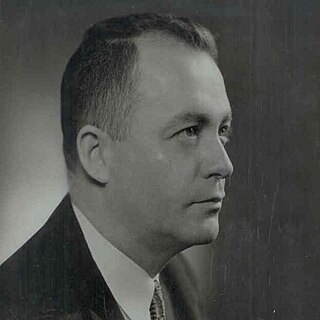
George Edward Burch, M.D. (1910–1986) was a shaper of modern cardiology during the middle part of the twentieth century, whose accomplishments included elucidating the fundamental physiological basis of important cardiovascular diseases, in addition to contributions to the teaching of medicine and cardiology. He was chairman of the Department of Medicine at Tulane University for many years. He is best known for his research in electrocardiography and vectorcardiography, for contributions to understanding viral-based cardiovascular diseases, for 12 books in the field of medicine and cardiology, and for more than 850 publications in the scholarly literature. He is also credited with the invention of the phlebomanometer, an instrument for measuring pressure in small veins. He elucidated effects of climate on the cardiovascular system and on congestive heart failure. He was a pioneer in the use of radioisotopes as tracers in medical research. Additionally Burch had wide influence as editor of the American Heart Journal (1959–82) and was an early anti-smoking activist.
Govindan Vijayaraghavan is a cardiologist from India, credited with establishing the first 2D Echocardiography laboratory in India. He is the vice-chairman & Founder Director of the Kimshealthcare Trivandrum and the President of the Society for Continuing Medical Education and Research, Trivandrum, Kerala. He was honoured by Government of India in 2009 for his services in the field of medical sciences by awarding him Padmashri.
Salim Yusuf is an Indian-born Canadian physician, the Marion W. Burke Chair in Cardiovascular Disease at McMaster University Medical School. He is a cardiologist and epidemiologist. Yusuf has criticized the Dietary Guidelines for Americans and disputes the scientific consensus on dietary sodium and saturated fat intake.
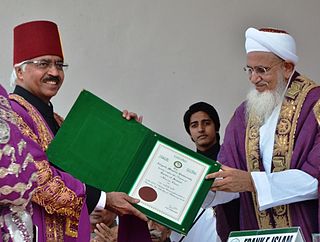
Ashok Seth is an Indian interventional cardiologist, credited with the performance of over 50,000 angiograms and 20,000 angioplasties, which has been included in the Limca Book of Records, a book for achievements and records from an Indian perspective. He is a Fellow of the Royal Colleges of Physicians of London, Edinburgh and Ireland and serves as the chief cardiologist, holding the chairs of the department of cardiovascular sciences and cardiology council at the Fortis Healthcare. Seth, a recipient of the Order of Isabella the Catholic, was honored by the Government of India with the fourth highest Indian civilian award of Padma Shri, in 2003, followed by Padma Bhushan, the third highest Indian civilian award, in 2015.
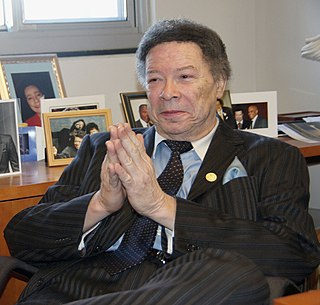
Levi Watkins Jr. was an American heart surgeon and civil rights activist. On February 4, 1980, he and Vivien Thomas were the first to successfully implant an automatic defibrillator in a human patient at Johns Hopkins University. This took place only a mere seven months after Watkins completed his surgical education at Johns Hopkins. Today, millions of patients everywhere use this device, which detects irregular heart beats and corrects them.
Daljeet Singh Gambhir is an Indian cardiologist, medical academic, researcher and inventor and the Group Director of Cardiology at Kailash Group of Hospitals and Heart Institute, Delhi. He is the inventor of Infinnium Paclitaxel-Eluting Stent, a reportedly cheaper drug-eluting stent which he first presented at the EuroPCR meeting held in Paris in 2003. A fellow of the National Academy of Medical Sciences and an honorary fellow of the Indian College of Cardiology, he is reported to have performed over 10,000 coronary interventions. The Government of India awarded him the fourth highest civilian honour of the Padma Shri, in 2016, for his contributions to medicine.

Kamal Kumar Sethi is an Indian neurologist
Suzanne Oparil is a clinical cardiologist and Distinguished Professor of Medicine, Professor of Cell, Developmental, and Integrative Biology. She is the Section Chief of Vascular Biology and Hypertension and the Director of the Vascular Biology and Hypertension Program of the Division of Cardiovascular Disease at the University of Alabama-Birmingham (UAB) Medical School.
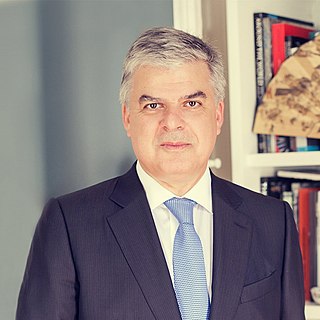
Fausto J. Pinto is a Portuguese academic. He is Professor of Cardiology at Hospital de Santa Maria. Former dean of the Faculty of Medicine at the University of Lisbon.

James Thornton Willerson was an American cardiologist. He was the President Emeritus, Director of Cardiology Research, and Co-Director of the Cullen Cardiovascular Research Laboratories at the Texas Heart Institute. Upon moving to Houston in 1989, Willerson created the Institute of Molecular Medicine for the Prevention of Human Diseases.
References
- Alabama Academy of Honor: Thomas Naum James, web page accessed 9 May 2008.